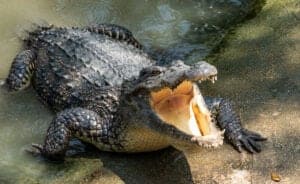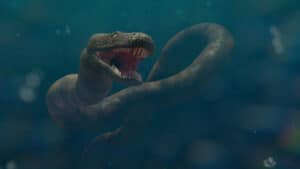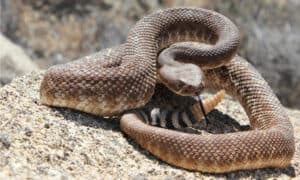When most people think of Louisiana, they think of its rich heritage and culture. However, this state is also scattered with magnificent terrain. While its swamps, marshes, and deltas get the most credit, it is also home to wet savannahs, pine forests, and lakes. In addition, this state is packed with natural scenery like the Kisatchie National Forest, Driskill Mountain Range, and the Gulf of Mexico. Furthermore, there are several natural and man-made lakes in the state, providing a home and water source for an abundance of wildlife, including snakes. So, what are the most snake-infested lakes in Louisiana? Continue reading to find out.
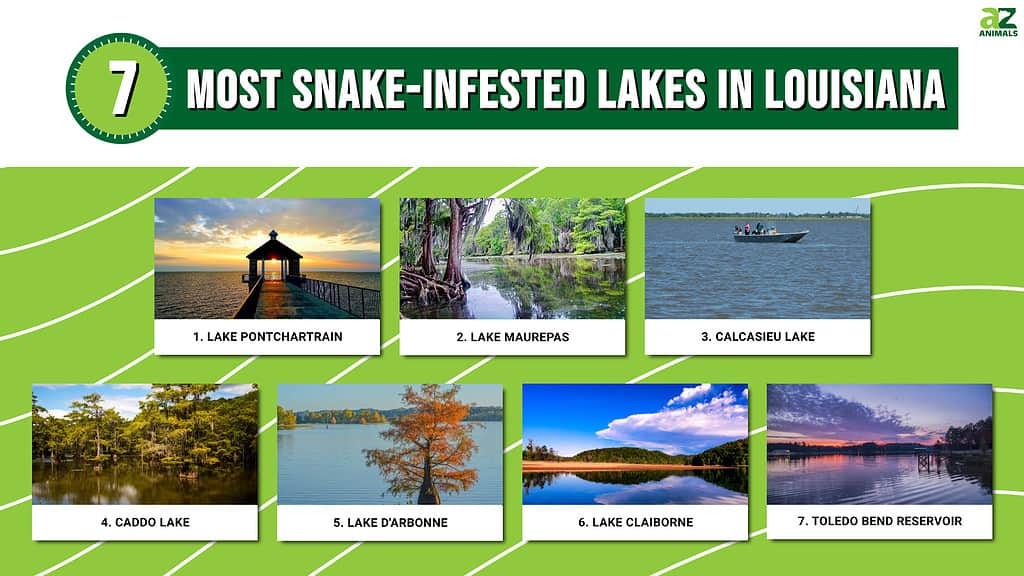
1. Lake Pontchartrain
While this massive body of water is referred to as a lake, it’s actually an estuary. Lake Pontchartrain is fed by several Northshore bayous and rivers connecting to the Gulf of Mexico. This lake encompasses around 630 square miles; its width is approximately 40 miles wide from east to west and 24 miles south to north. In addition, its depths average about 12 to 14 feet. Lake Pontchartrain is primarily freshwater, but the further west you go, the more salinity. This lake serves as a home or water source for numerous snake species, and it is definitely one of the most snake-infested lakes in Louisiana, including species like:
- Ball python
- Brahminy blindsnake
- Pygmy rattlesnake
- Timber rattlesnake
- Eastern copperhead
- Northern cottonmouth
- Gray ratsnake
- Western ratsnake
- Corn snake
- Black kingsnake
- Speckled kingsnake
- Scarlet kingsnake
- Rough greensnake
- Scarlet snake
- North American racer
- Mudsnake
- Eastern hognose snake
- Pine woods littersnake
- Eastern worm snake
- Ring-necked snake
- Glossy swampsnake
- Common garter snake
- Common ribbon snake
- Common watersnake
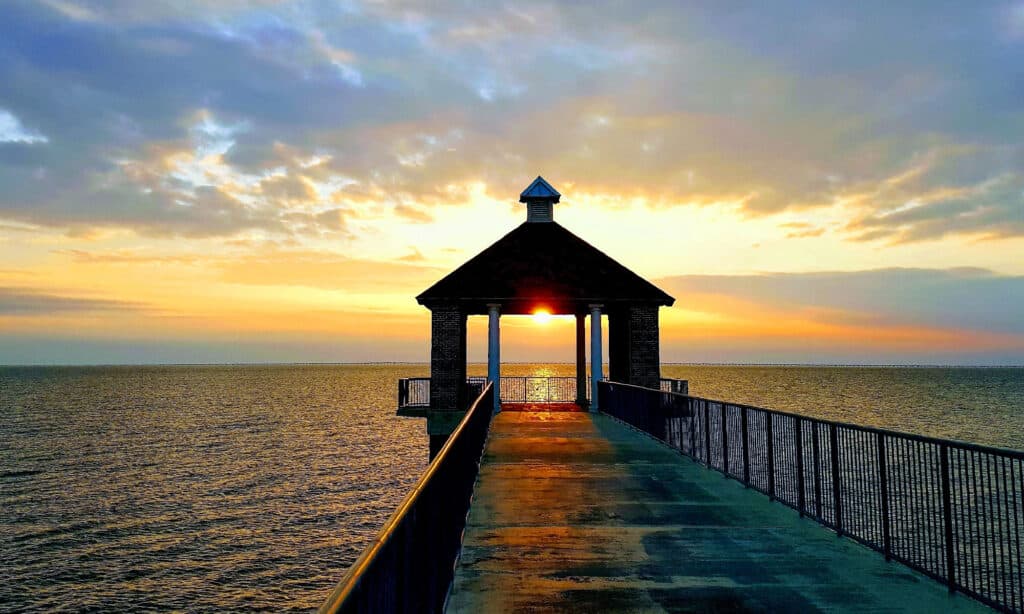
Lake Pontchartrain is primarily freshwater, but the further west you go, the more salinity.
©iStock.com/Idylle Images
2. Lake Maurepas
Lake Maurepas is larger than Lake Salvador or Calcasieu as it spans over 15, 000-acres. But this lake really stands out because there are no towns, cities, developments, or factories on its shores. However, there is a hint of civilization on the lake’s far eastern end. For example, Interstate 55 has an overhead bridge that crosses the lake. But, besides that, it is as picturesque as a postcard, with its tupelo and cypress swamp. This lake receives freshwater from the Amite, Blind, Natalbany, and Tickfaw Rivers. As a result, the ecosystem in Lake Maurepas provides the surrounding wildlife with the essentials they need to survive. This includes the multiple snakes that inhabit the area, including:
- Common garter snake
- Common ribbon snake
- Western ribbon snake
- Dekay’s brownsnake
- Diamondback watersnake
- Banded watersnake
- Mississippi green watersnake
- Plain-bellied watersnake
- Glossy swampsnake
- Ring-necked snake
- Mudsnake
- North American racer
- Rough greensnake
- Western ratsnake
- Gray ratsnake
- Northern cottonmouth
- Eastern copperhead
- Ball python
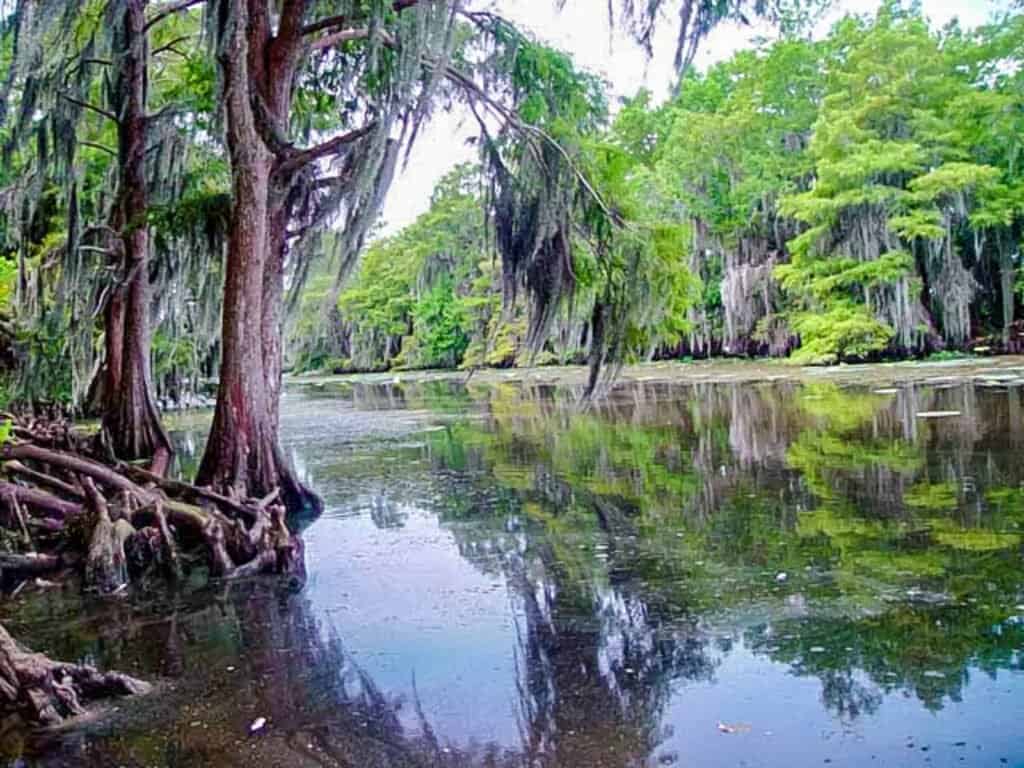
The ecosystem in Lake Maurepas provides the surrounding wildlife with the essentials they need to survive.
©iStock.com/undefined undefined
3. Calcasieu Lake
Calcasieu Lake sits on the Chenier Coastal Plain near the Louisiana-Texas border. Furthermore, this lake receives freshwater from the Calcasieu River and flows through the Calcasieu Pass to the Gulf of Mexico. Calcasieu is characterized by marshes, which can be saline, brackish, or intermediate. While the lake supports various wetlands and marine habitats, but it is primarily made up of marshlands. Animals that are dependent on this lake include muskrats, Gulf menhaden, shrimp, and waterfowl. However, it also provides snakes with a water source and food. Snakes that call Calcasieu Lake home include:
- Pygmy rattlesnake
- Timber rattlesnake
- Eastern copperhead
- Northern cottonmouth
- Eastern coralsnake
- Texas coralsnake
- Western ratsnake
- Speckled kingsnake
- Rough greensnake
- Scarletsnake
- North American racer
- Coachwhip
- Mudsnake
- Eastern hognose snake
- Ring-necked snake
- Glossy swampsnake
- Rough earthsnake
- Plain-bellied watersnake
- Mississippi green watersnake
- Saltmarsh snake
- Banded watersnake
- Diamondback watersnake
- Graham’s crayfish snake
- Dekay’s brownsnake
- Red-bellied snake
- Western ribbon snake
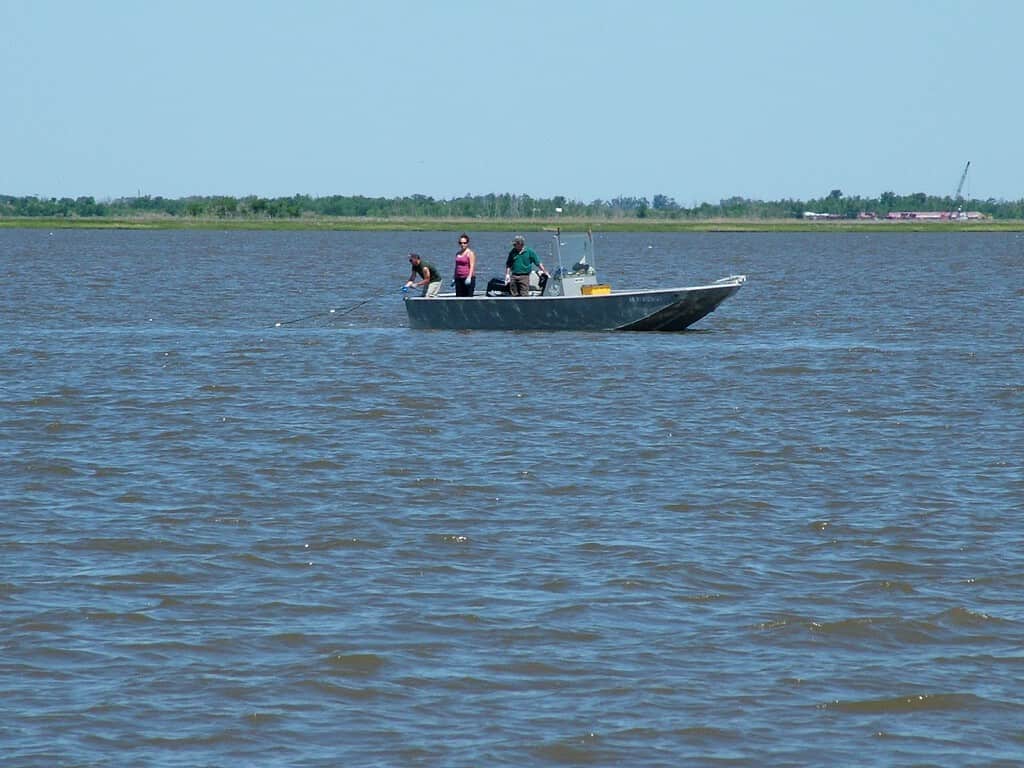
Calcasieu Lake sits on the Chenier Coastal Plain near the Louisiana-Texas border.
©Louisiana Sea Grant College Program Louisiana State University / CC BY 2.0 – License
4. Caddo Lake
This 25,400-acre lake and wetland sits on the border between Louisiana and Texas. Luckily, under the RAMSAR treaty, this lake is an internationally protected wetland. In addition, it is the biggest natural freshwater lake in the South. Furthermore, it has the largest Cypress forest in the world. This lake boasts an abundance of recreational activities thanks to several privately owned businesses, like sightseeing tours, restaurants, and marinas. Additionally, there are various parks on the lake operated by several Louisiana parishes. Therefore, all this activity may scare away some of the local wildlife, including snakes. As a result, there are only three snake species that rely on Caddo Lake:
- Northern cottonmouth
- Western Ratsnake
- North American racer
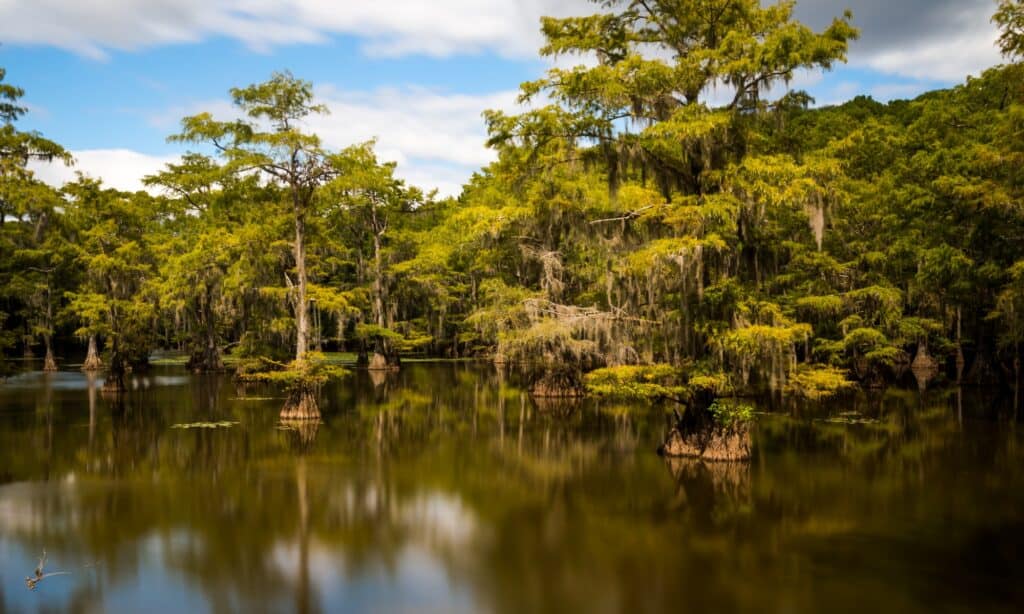
Caddo Lake has the largest Cypress forest in the world.
©Victoria Ditkovsky/Shutterstock.com
5. Lake D’Arbonne
Lake D’Arbonne covers 15,280 acres, of which 80% sits in Union Parish and 20% in Lincoln Parish. It is 15 miles long, with a shoreline over 100 miles long. Furthermore, its average depth is six feet, and its widest point is three feet wide. This lake was stocked by the Fisheries and Louisiana Wildlife Department, which attracts many anglers. In addition, many summer homes, permanent homes, campsites, and commercial lands were constructed on its shores. As a result, there is also a small airstrip for private planes. Lastly, the state parks in the area offer accommodation with tennis courts, swimming pools, fishing piers, boat launching ramps, meeting rooms, pavilions, and trailer hookups. Naturally, Lak D’Arnonne’s various ecosystems attract all sorts of wildlife, including the following snakes:
- Common garter snake
- Western ribbon snake
- Banded watersnake
- Speckled kingsnake
- Western ratsnake
- Northern cottonmouth
- Eastern copperhead
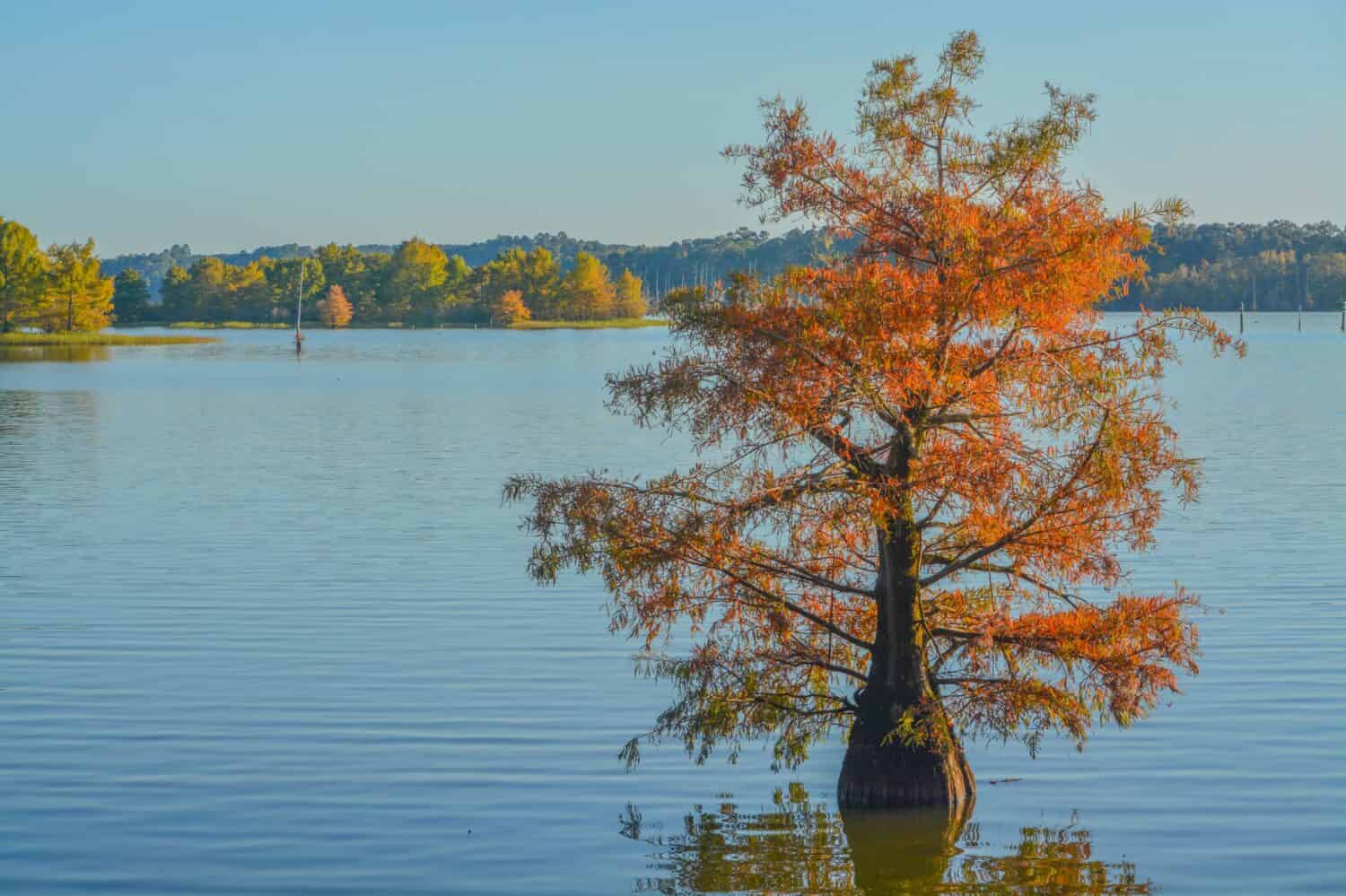
Lake D’Arbonne covers 15,280 acres, of which 80% sits in Union Parish and 20% in Lincoln Parish. It is 15 miles long, with a shoreline over 100 miles long.
Image: Norm Lane, Shutterstock
©Norm Lane/Shutterstock.com
6. Lake Claiborne
Lake Claiborne is a man-made lake located near Homer, Louisiana. This lake covers an estimated 6,400 acres in a rural area and is a popular fishing area. Furthermore, it is surrounded by Lake Claiborne State Park, with plenty of camping and recreational areas. Additionally, this park offers two world-class disc golf courses. Lake Claiborne was created by the United States Army Corps of Engineers in 1970. Although it is an artificial lake, it still hosts an abundance of wildlife. Snake species in Lake Claiborne include:
- Common garter snake
- Western ribbon snake
- Dekay’s brownsnake
- Graham’s crayfish snake
- Diamondback watersnake
- Banded watersnake
- Mississippi green watersnake
- Plain-bellied watersnake
- Rough earthsnake
- Glossy swampsnake
- Ring-necked snake
- Eastern hognose snake
- Mudsnake
- Coachwhip
- North American racer
- Scarletsnake
- Flat-headed snake
- Louisiana pinesnake
- Rough greensnake
- Western ratsnake
- Texas coralsnake
- Eastern coralsnake
- Northern cottonmouth
- Eastern copperhead
- Timber rattlesnake
- Pygmy rattlesnake
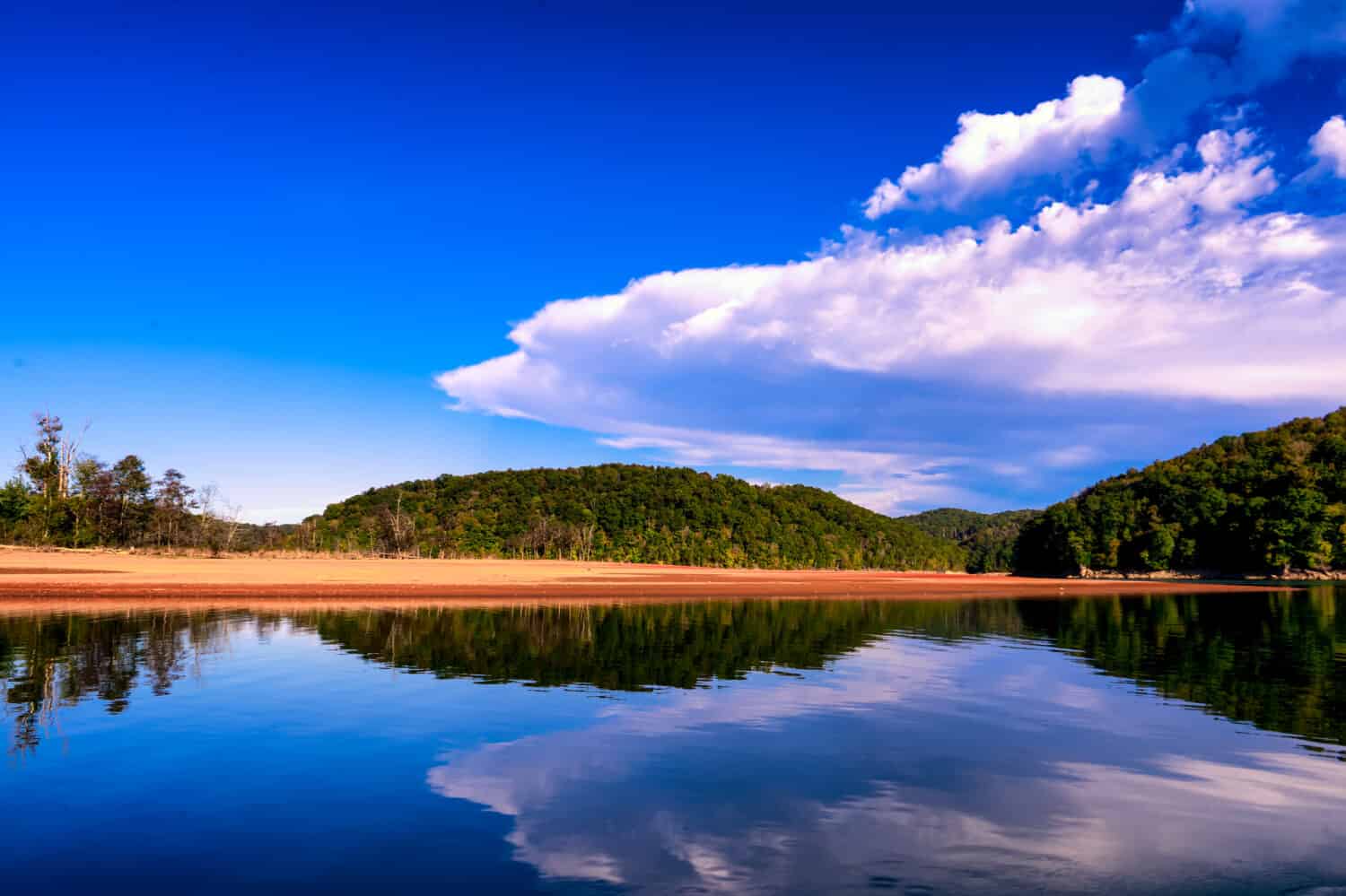
Lake Claiborne was created by the United States Army Corps of Engineers in 1970.
Image: Stephen P Robinson, Shutterstock
©Stephen P Robinson/Shutterstock.com
7. Toledo Bend Reservoir
The Toledo Bend Reservoir is a 181,600-acre man-made lake with both power generation and recreational benefits. At its deepest point, Toledo Bend Reservoir measures 110 feet deep. This massive artificial lake is the creation of the Sibine River Authority of Texas and Louisiana. It measures approximately 65 miles and ends near Logansport, Louisiana. Furthermore, this lake stretches along the Louisiana and Texas border, west of Many, LA. Tourists from all over the world visit this stunning lake because of its fishing, boating, camping, skiing, hiking, golfing, and other recreational activities.
Furthermore, there is endless enjoyment for outdoors people, like campgrounds, RV resorts, and 1,200 miles of breathtaking shoreline. Lastly, this lake is ranked as one of the top sport fishing spots in the USA. It is also a host to numerous wildlife, like the following snakes:
- Eastern cottonmouths
- Canebrake rattlesnakes
- Texas coralsnakes
- Western pygmy rattlesnakes
- Southern copperheads
- Texas ratsnake
- Prairie kingsnake
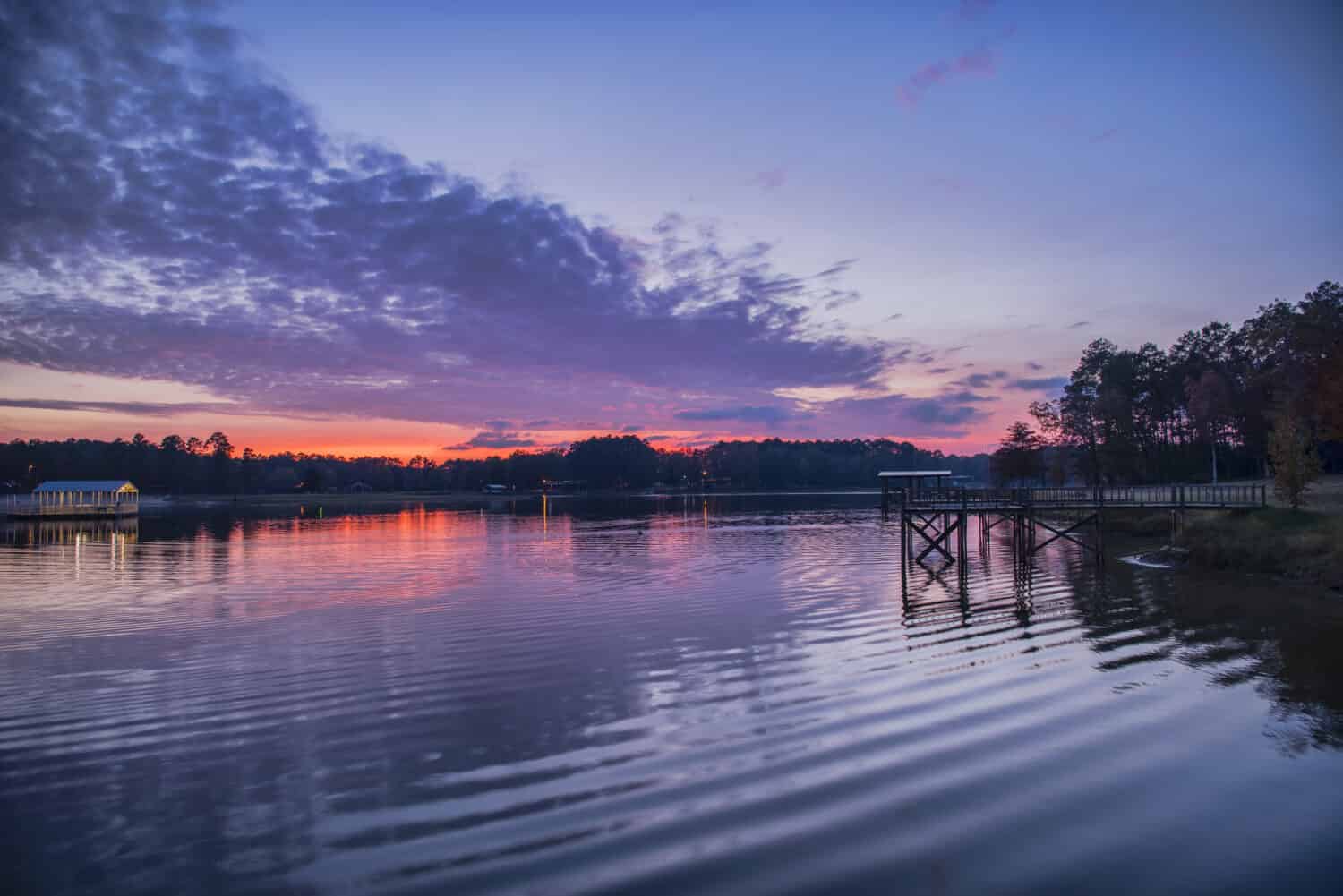
At its deepest point, Toledo Bend Reservoir measures 110 feet deep.
Image: Bonnie Taylor Barry, Shutterstock
©Bonnie Taylor Barry/Shutterstock.com
Summary of the 7 Most Snake-infested Lakes in Louisiana
| # | Lake | Fun Fact |
|---|---|---|
| 1 | Lake Pontchartrain | Is actually an estuary fed by Northshore bayous and rivers connecting to the Gulf of Mexico |
| 2 | Lake Maurepas | With only a hint of civilization on its shores – this lake is a perfect environment for snakes |
| 3 | Calcasieu Lake | Primarily made up of marshlands |
| 4 | Caddo Lake | Biggest natural freshwater lake in the south with largest Cypress forest in the world |
| 5 | Lake D’Arbonne | This lake was stocked by the Fisheries and Louisiana Wildlife Department |
| 6 | Lake Claiborne | The adjoining park offers two world-class disc golf courses |
| 7 | Toledo Bend Reservoir | This stunning lake measures 65 miles or 181,600 acres |
The photo featured at the top of this post is © Dennis W Donohue/Shutterstock.com
Discover the "Monster" Snake 5X Bigger than an Anaconda
Every day A-Z Animals sends out some of the most incredible facts in the world from our free newsletter. Want to discover the 10 most beautiful snakes in the world, a "snake island" where you're never more than 3 feet from danger, or a "monster" snake 5X larger than an anaconda? Then sign up right now and you'll start receiving our daily newsletter absolutely free.
Thank you for reading! Have some feedback for us? Contact the AZ Animals editorial team.




